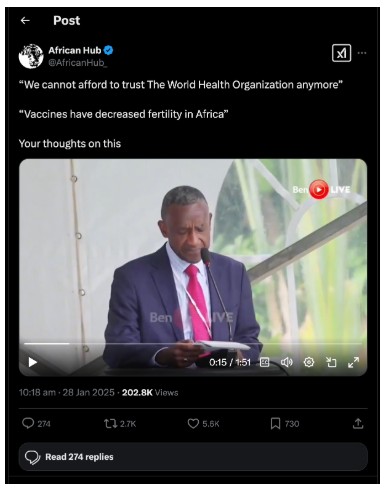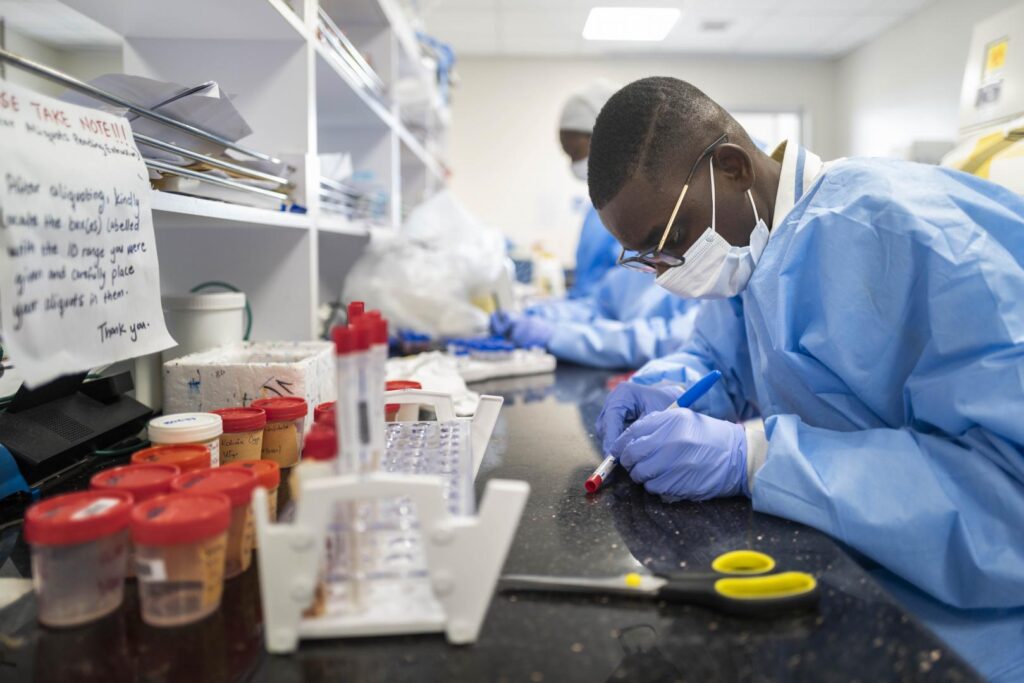Claim: A Kenyan gynaecologist has made unfounded claims about malaria, tetanus and HPV vaccines.
Source: Social media
Verdict: All false
Researched by Gifty Tracy Aminu
A video showing a man identified as Dr Wahome Ngare, a Kenyan gynaecologist, addressing a gathering with Ugandan president Yoweri Museveni and other guests in attendance, is heard making claims about Tetanus, Malaria, and Human Papillomavirus (HPV) vaccines.
According to GhanaFact checks, Dr Ngare made the series of claims during a three-day event dubbed – “African Inter-Parliamentary Conference on Family Values and Sovereignty” in Entebbe, Uganda, held in May 2024.
In the 7-minute and 59-second WhatsApp video tagged as “Forwarded Many Times” and captioned “share widely please”, the medical doctor claimed vaccines introduced by the World Health Organisation (WHO) cause infertility in Africa.
 Screengrab of the viral video as shared on WhatsApp
Screengrab of the viral video as shared on WhatsApp
This article will seek to verify the major claims he made in the video.
Meanwhile, GhanaFact found that the video was circulated on X by the @Africahub_ account, and had been shared 2.7k times, liked 5.6k and gathered 274 replies.

A snippet of the video shared on an X account garnered a lot of interaction
GhanaFact noted that the video is old and keeps circulating on social media platforms by anti-vaxxer groups to undermine the efficacy and effectiveness of vaccines thus boosting vaccine hesitancy.
This fact-check report seeks to verify the claims made in the viral video.
Debunks from the World Health Organisation and Health Agencies
The World Health Organisation when the video was first circulated strongly condemned the allegation levelled against the vaccines that have saved millions of lives all over the world.
In a joint statement from the Ministry of Health of Uganda where the “African Inter-Parliamentary Conference on Family Values and Sovereignty” event was hosted, the country representatives of the WHO and UNICEF, the President of the Uganda Paediatrician Association, and other health agencies refuted the claims made by the medical practitioner against the vaccines.
Claim 1 – Tetanus vaccine ‘is a fertility-regulating vaccine’
“In 2014-2015, WHO brought a tetanus eradication campaign in our country. It was a campaign to eradicate neonatal tetanus. Babies who are born, who eventually get tetanus and the vaccine that was used is a different type of tetanus vaccine that is a fertility-regulating vaccine. Where they take tetanus and combine it with a hormone called Human Chorionic Gonadotropin (HCG) that supports pregnancy.
“And when you inject a woman with that vaccine, she produces antibodies against that hormone and, therefore, is rendered sterile. So, we are noticing an increase in the number of infertility cases among young couples who you examine, and they are normal, but cannot get children or couples who are losing 3, 4, 5, pregnancies before they can carry any pregnancy to term.”
Fact-check
The joint statement debunked the claim about the tetanus vaccine and said: “The Tetanus Toxoid Vaccine has been given to our children from 6 weeks of age and women of reproductive age group for several decades. Our women still remain the most fertile in the world. Uganda eliminated Neonatal tetanus which was a big cause of neonatal mortality.”
The statement further highlighted that the group of anti-vaxxers in Kenya submitted unverified samples to laboratories and claimed they contained HCG. These were tested by independent investigators and found not to contain HCG.
A joint statement from WHO and UNICEF highlighted the following;
“The World Health Organization (WHO) and the United Nations Children’s Fund (UNICEF) express their deep concern about the misinformation circulating in the media on the quality of the Tetanus Toxoid (TT) Vaccine in Kenya.
“The allegations are that the tetanus vaccine used by the Government of Kenya and UN agencies is contaminated with a hormone (hCG) that can cause miscarriages and render some women sterile. These grave allegations are not backed up by evidence, and risk negatively impacting national immunisation programmes for children and women.
“Human chorionic gonadotropin (hCG) is a hormone produced by the placenta, during pregnancy. hCG is also produced in the pituitary glands of males and females of all ages. However, very high levels pose risks to pregnancy.
“We have taken note of test results claiming to show levels of hCG in samples submitted to some clinical laboratories. However, it is important to note that testing for the content of a medicine, e.g TT Vaccine needs to be done in a suitable laboratory, and from a sample of the actual medicine/vaccine obtained from an unopened pack and not a blood sample. Furthermore, the Pharmacy and Poisons Board the legally mandated National Regulatory Authority has the capacity and mandate to determine the quality, safety and efficacy of medicines and to advise the Government accordingly.
“WHO and UNICEF confirm that the vaccines are safe and are procured from a pre-qualified manufacturer. This safety is assured through a three-pronged global testing system and the vaccine”
This statement was reiterated by the then Deputy Spokesperson for the United Nations General Secretary, Farhan Haq, during the organisation’s daily press briefing on November 12, 2014
Also, GhanaFact noted that the claims were mentioned once during the Kenya Bishop’s Conference in 2014, in which the WHO and UNICEF issued a joint statement.
Claim 2 – Malaria is treatable just by drinking tea of the artemisia plant
“WHO has been working on how Africa can eradicate malaria, and up to today, we still haven’t been able to eradicate malaria and now they have proposed GMO mosquitoes. It seems like it’s not enough to own seed that is going to be used to make our people poor because of GMO seed, now they are proposing GMO mosquitoes that apparently will sterilise the natural ones.
“Now we do not know the extent of damage that kind of activity would take but worst of all is they are proposing vaccination of our children against malaria. Yet malaria is a treatable disease.
“In fact, the trees that are being used to create quinine, which is one of the best medicines, especially where there is resistance, the trees are grown here in Congo. Artemisia Afra Atimisa Anwa is a herb that treats malaria just by drinking the tea of the herb.”
Fact-check
Dr. Ngare’s claim about herbal tea treatment for malaria was premised on a research by a Congolese medic, but the paper has since been retracted by the US medical journal that initially published it stating thus: “This article has been retracted at the request of the Editor-in-Chief.
“Concerns have been raised about the timely approval of the Ethics Committee for the study presented by this article, the consent of the trial participants to publish their data, as well as the reliability of the data included in the article. The authors were not able to provide reasonable explanations and the Editor-in-Chief decided to retract the article,” it added.
At present, WHO recommends Artemisinin-based Combination Therapies (ACTs) as the best way to treat malaria.
The World Health Organisation further recommended measures including; sleeping under treated mosquito nets, using mosquito repellents (containing DEET, IR3535 or Icaridin) after dusk, using coils and vaporizers and wearing protective clothing to prevent malaria.
The World Health Organisation has stated its position on the use of the Artemisia plant to cure malaria as suggested in parts of the video.
WHO’s response on the promotion or use of Artemisia plant material in any form, for the prevention or treatment of malaria
- The content of the Artemisia herbal remedies given for malaria treatment and prevention varies substantially.
- The content in Artemisia herbal remedies is often insufficient to kill all malaria parasites in a patient’s bloodstream and to prevent recrudescence.
- Widespread use of Artemisia annua herbal remedies could hasten the development and spread of artemisinin resistance.
- Artemisinin in any form does not work well as a prevention against malaria.
- Affordable and efficacious treatments for malaria are available.
From the above, Dr. Ngare’s claims on preventive measures for malaria and the introduction of malaria vaccine are confirmed to be true.
The WHO also recommends the use of malaria vaccines for the prevention of P. falciparum malaria in children living in malaria-endemic areas, prioritizing areas of moderate and high transmission
In the case of the introduction of genetically modified (GMO) Mosquitoes, the Center for Disease Control Prevention (CDC) of the United States have explained that “The expected result of using GM mosquitoes is that the numbers of Ae. aegypti mosquitoes in an area decreases.”
Key highlights from Health Agencies including WHO about malaria vaccine.
“In 2021, the malaria vaccine was approved by the WHO for widespread use as one of the key additional measures to reduce the malaria burden. This vaccine will offer an opportunity to protect children under five years from severe Malaria and related complications.
“Herbal medicines will not prevent severe malaria and death,” the joint statement by the Uganda Health Ministry and other health agencies reiterated.
Claim 3 – Virgins at risk of getting HPV and those who get it do not need any treatment
“We are supposed to inject our girls from the age of ten with a vaccine called Human Papilloma Vaccine. Now that vaccine is being said to be a vaccine for preventing cancer of the cervix. Your Excellency, that vaccine is for a sexually transmitted disease called Human Papilloma Virus Disease. It is not for cancer.
“Now, any virgin, whether male or female, is not at risk of getting HPV, and it is only on the fast sexual experience that there is a risk that one could get this disease, and if a woman got (gets) this disease and got (gets) sick with HPV, over 90% of them, their natural immunity destroys the virus, and she does not need any treatment from anyone.”
Fact-check
With regards to HPV vaccination, the WHO statement explained that Human papillomavirus is the most common viral infection of the reproductive tract in both men and women. It is sexually transmitted and is known to cause the following: cervical, vulva, virginal, and penile cancers, genital warts, and cancer of the mouth.
“In Uganda, HPV vaccination was introduced in 2015. It is administered to young girls aged 9 to 14 years who are not yet sexually active. This is because the vaccine effectiveness is highest before exposure to the virus.
“The HPV vaccine is safe and effective. No vaccines-related adverse effects have been reported for this age group,” the statement added.
On HPV vaccines causing infertility, the World Health Organisation and the Pan American Health Organisation have debunked the claim. This is to highlight the claim that keeps recirculating across the world that the vaccine is meant to reduce fertility in African women.
“No. Although this myth has received a lot of attention in the media, WHO’s Global Advisory Committee on Vaccine Safety (GAVCS) has conducted an extensive review of the available scientific evidence and has concluded that there is no relationship between HPV vaccination and infertility.”
Conclusion
The Programme Manager (PM) of the Expanded Programme on Immunisation (EPI), at the Ghana Health Service (GHS), Dr Kwame Amponsah-Achiano, told GhanaFact in an interview that the video is old and only recirculated to undermine vaccine efficacy.
“This is an old video and the WHO released a statement to debunk it some time ago.”
Verdict:
The major claims are All False



